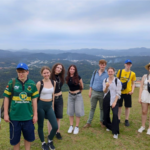An enriching experience: Colégio São Luiz students return after 40 days in Indonesia
First exchange program experience to the Asian country aimed to link Dehonian institutions
First exchange program experience to the Asian country aimed to
link Dehonian institutions
After 40 days in Indonesia, students from Colégio São Luiz are back in Brusque, Santa
Catarina, Brazil.
Amanda Erthal da Cunha, Guinter Comper, Henrique Cinelli Pedroso and Letícia
Stumpf de Souza returned from their exchange program on August 4th and brought with
them unique and unforgettable experiences.
This was Colégio São Luiz’s first exchange experience to the Asian country. The
students were accompanied by the coordinator of the Bilingual Program, Mariane Werner
Zen, and by Frater Ricardo Vinter, from the Congregation of the Fathers of the Sacred Heart
of Jesus.
They all came back delighted with everything they had seen and experienced over the
last 40 days. For the students, the experience was transformative.
“It was a journey of growth, not just as a student, but above all, of growth as a person.
We experienced a huge cultural difference and it was incredible. We met a lot of people. We
went to an elephant park, visited an active volcano and saw the largest Buddhist temple in
the world. We had unique experiences,” says Guinter.
Simple life
The simple life that Indonesian people lead and the appreciation of local culture are
among the most striking points mentioned by the students.
“We noticed that they are less attached to material goods. We met very wealthy
families who live in a simple way. For them, the most important thing is family and religion.
Material goods seem to be in the second plan,” says Amanda.
“They live a very simple but extremely happy life. That really struck me,” adds Letícia.
The harmony between the different religions practiced in the country also caught the
attention of the young people from Brusque. In Indonesia, most of the inhabitants are
Muslims, but there are also Buddhists, Hinduists, Catholics and Protestants.
“The way they live together, with totally different religions, is very beautiful. They’re
close, there’s a lot of respect,” says Amanda.
Experiences
During the 40 days, the students had the opportunity to get to know the local culture
and routine deeply. During the first few days of the trip, the young people stayed in convents
belonging to the Congregation of the Fathers of the Sacred Heart of Jesus, in the cities of
Yogyakarta and Palembang. Then, they left for the city of Metro, where they attended
classes and stayed in school accommodation. There, they were also able to experience
homestay, experiencing the daily life of a local resident. The last part of the trip was in
Jakarta, the capital of Indonesia, where the exchange students got to know a new school
and were also hosted by local families.
“Those 40 days were a unique experience. I loved every moment of it and tried to live
it intensely, knowing that I wouldn’t have another opportunity like this,” says Henrique.
The students from Colégio São Luiz say that they were very well received since their
first day in the country, and that the Indonesians made a point of including them in all the
activities, especially the cultural ones.
During the exchange, the youths also made many friends and intend to keep in touch
regularly with them. They are unanimous in their desire to return to Indonesia one day to see
these people again and get to know more new places in the Asian country.
The importance of English
The official language in Indonesia is Indonesian, but there are more than 700 dialects
that are also spoken in the country. The exchange students learned the basics of the official
language, but they communicated the most in English.
Teacher Mariane, who accompanied the students, points out that the children in
Indonesia, at the schools they visited, could speak English very well and this made it
possible for them to communicate better with the exchange students.
“We met a lot of children speaking English. Both, Indonesian students and Brazilian
students, saw the importance of the English language, because it allowed all of us to make
new friends and get to know the culture of the country.”
The teacher recalls that during the classes each exchange student was accompanied
by a local student who spoke English and helped with translation.
“I even managed to learn some of the school content. The teachers made a lot of effort
so that we could take part in the lessons and understand what was being taught,” says
Henrique.
SCJs in Indonesia
During the trip, the exchange students also learned about the work carried out by the
Congregation of the Fathers of the Sacred Heart of Jesus in Indonesia.
Teacher Mariane points out that the dehonians have been in the country for almost 100
years and, just like in Brazil, do a lot of work in education.
“When the priests arrived in Indonesia, they invited the Sisters of Charity to help them
with education, just as happened in Brusque (Brazil) with the Sisters of Divine Providence.”
According to her, the two Dehonian schools are very close to each other, even though
they are located in distant cities. “There, they really cultivate the values of love, compassion,
readiness and sacrifice. We also presented about Colégio São Luiz and emphasized Father
Dehon’s quote: ‘open mind and open heart’, which means having a mind that is open to what
is different, to what is new, and a heart that welcomes and respects what is different.”
Frater Ricardo Vinter, who also accompanied the group, points out that as Catholics
are a minority, Catholicism is experienced very intensely in the country. “As they are a
minority, they need to create a strong bond with the community, because their neighbors
aren’t always Christian or Catholic, so they do it in church. It’s nice to realize that they go to
Mass early, and afterwards they chat, without rushing, cultivating bonds.”
He also notes the work done by the congregation in schools, especially embracing
differences. “Their work in schools is beautiful, this apostolate they do in the field of
education, realizing that, sometimes, there are more Muslim students in a Catholic school
than Christians, or more Protestants, and we can see that they manage to experience this in
a healthy way, respecting differences.”
The idea now is to maintain the relationship between the two Indonesian schools and
Colégio São Luiz, through online exchanges, until it is possible for students from the Asian
country to come to Brusque, Brazil. “We intend to continue cultivating our links, because that
was our mission there, to promote integration between the Dehonian schools,” says teacher
Mariane.
Acknowledgements
The exchange students taking part in this project are very grateful for everything that
has been given to them during this period. They are very grateful to the province of
Indonesia, the congregation of the Fathers of the Sacred Heart of Jesus, for opening the
doors to this experience on the other side of the world. Doors that remain open so that more
students, teachers and religious can be part of this project of internationalization and
knowledge of the Dehonian charism, realizing its dimension in the various world realities.
Exchange means being able to make and maintain exchanges of experiences and cultures,
it means learning about oneself and the other. It’s maintaining the attitude of our founder,
having an open mind and an open heart – Open Mind, Open Heart.
“Many people made this project happen. Our thanks go to Father Albertus Joni, Father
Kusmartono, Father Sigit Pranoto, Brother Gatot, Father Edi, Deacon Edi, among many
others who accompanied and welcomed us during these 40 days and made Indonesia our
home.”, says teacher Mariane representing the group.
A poet says that at the end of a journey, you never go back, because the place you
return to is never the same. In reality, at the end of this exchange program to Indonesia,
those who return are no longer the same. They are different from who they were when they
left Brazil. The experience of crossing oceans and continents, and experiencing a bit of
oriental culture throughout the period, has sharpened their perceptions of the world and
broadened their ideas about cultural differences. It broke down prejudices and built bridges
of respect for the new and the different. In fact, it was a transformative and unforgettable
experience.



